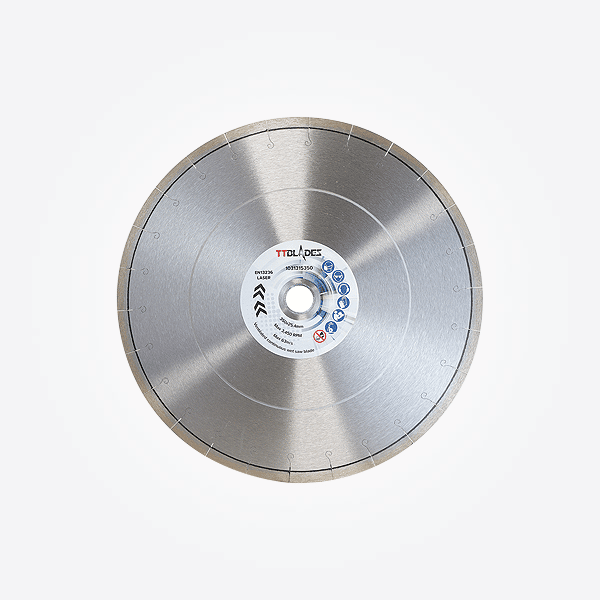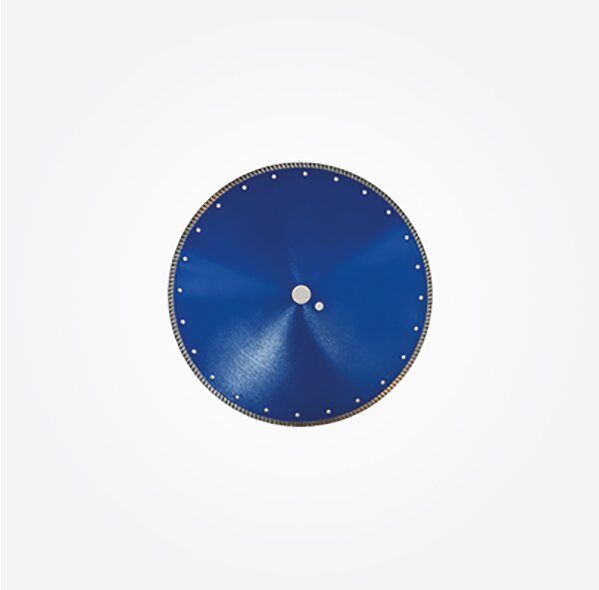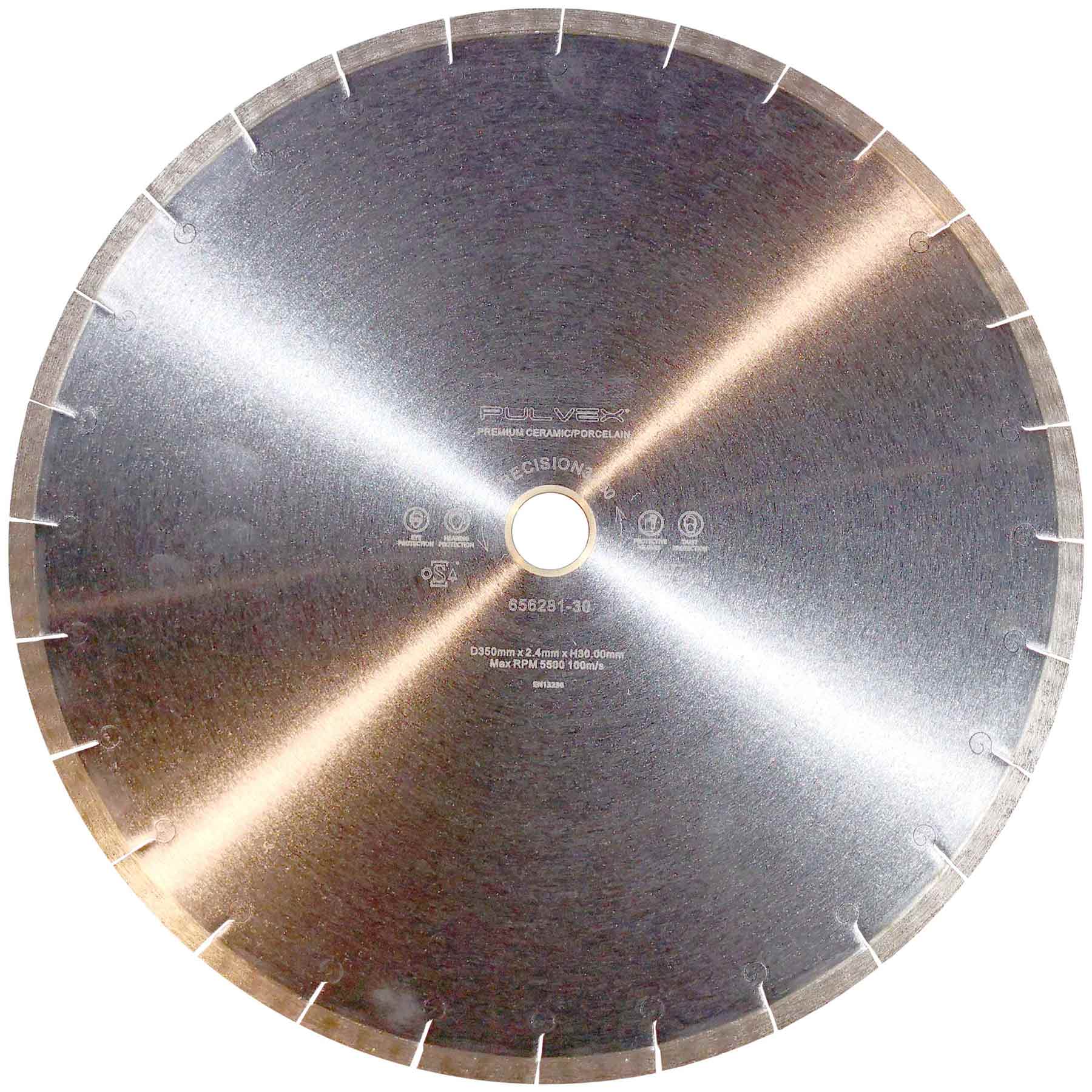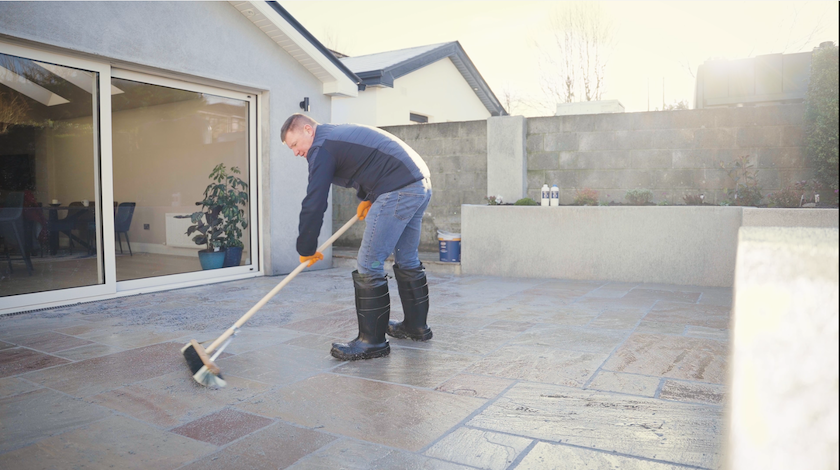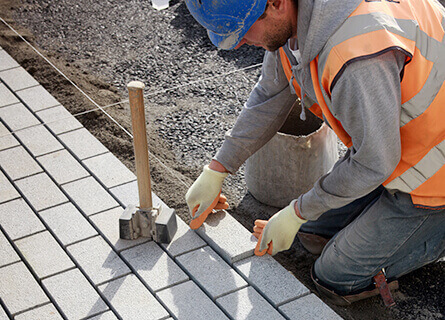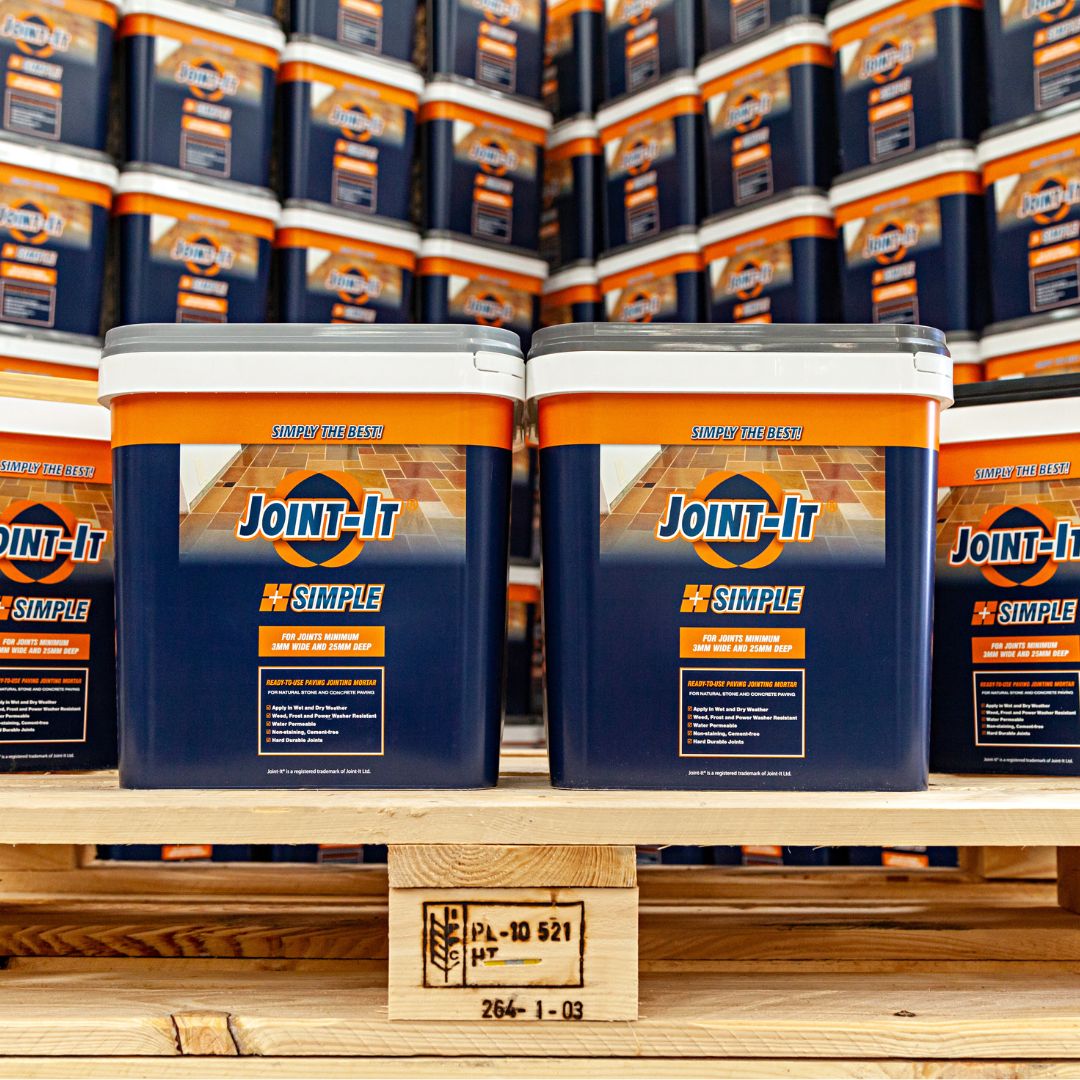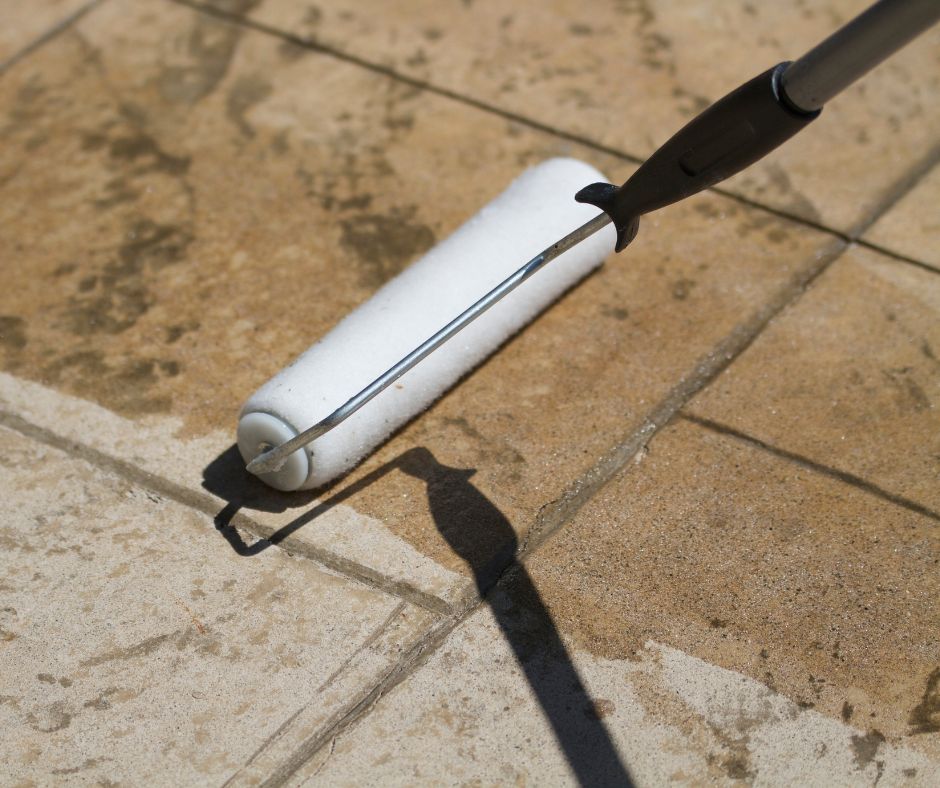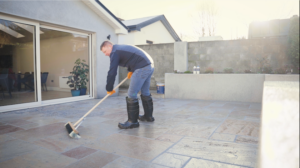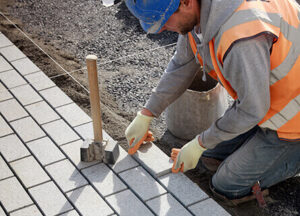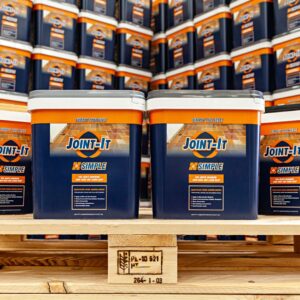Although porcelain is a heavy paving product, porcelain tiles need to be handled with care. Explore exactly how to cut porcelain tiles without chipping them, together with the recommended cutters and blades.
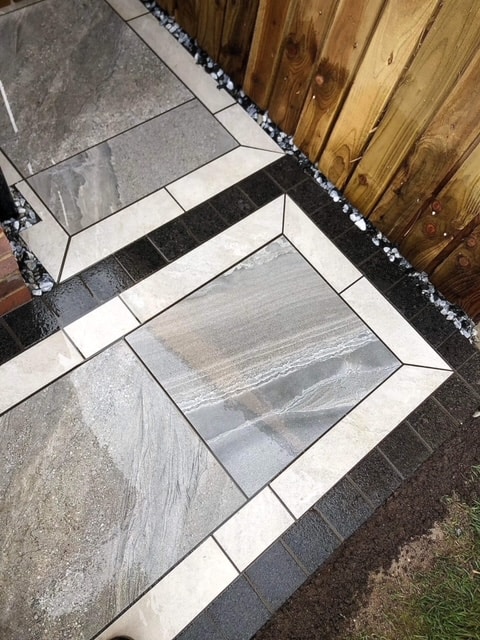
Are porcelain tiles easy to cut?
When cutting porcelain, you’ll often need a professional tile cutter and a good quality blade to make a clean and skillful cut. This is especially the case for 20mm porcelain tiles that boast a much stronger tensile strength than a standard 10mm porcelain tile.
Along with the aesthetic appeal of outdoor porcelain tiles, these sleek paving options are also manufactured to provide extra durability and to withstand heavy loads.
If you’ve experienced some problems with cutting porcelain, it’s likely that you’re using incorrect equipment, or that the blade has not been sharpened enough.
As external porcelain paving is such a hard material, it’s ever-so important to use the right cutter and the correct blade. Read on to find out the best options to avoid chips and also any blade damages.
What is the best tool for cutting porcelain tiles?
Which tool you use to cut porcelain really depends on the type of cut you want to achieve.
For a simple straight cut, use a powerful diamond blade table saw with an adjustable blade like the Raimondi Zoe 150 Advanced Wet Saw or the Pikus 130 Advanced Wet Saw. Read on to find out more about each of these options.
For large cuts, angle grinders are not recommended. You could instead use a petrol-driven cut off saw that features a dust suppression tank.
When it comes to hand tools, it’s best to limit using them on 20mm porcelain as the spinning blade can cause a gyroscopic effect.
Pikus 130cm Advanced Wet Saw
Manufactured by Raimondi, the Pikus 130 Wet Saw cuts porcelain tiles and all types of natural stone up to a maximum length of 130cm. What’s more, it comes complete with a 250mm diamond disc for porcelain.
As a mid-range machine, the Pikus 130 is 115V with a 1.3HP motor and features a wet cutter with an adjustable cutting depth of up to 80mm in one single pass (up to 150mm for a double pass).
Complete with a tilting motor assembly, bevel cuts can be made between 0º and 45º, cut to a maximum length of 105cm.
Similar to the Zoe 150 (outlined below), the Pikus 130 comes with telescopic legs with an anti-collapse device, and wheels to allow it to be easily transported to and from site.
Save with the Pikus Bundle Deal!
The Pikus 130 Bundle Deal includes a 110 volt transformer and free delivery*, plus a 250mm diamond blade for porcelain
*Note: as part of the bundle deal, delivery is free to England and Wales. A small charge may apply to Scotland. Call us for details.
Zoe 150cm Advanced Wet Saw
Also available with a blade ideal for cutting porcelain is the Zoe 150 Wet Saw.
Slightly larger than the Pikus 130, the Zoe 150 can cut all types of tiles and slabs (including porcelain) up to a maximum cut length of 155cm. Bevel cuts can be made between 0º and 45º, and again with a maximum length of 155cm.
As with the Pikus, Raimondi’s Zoe 150 features a heavy-duty, dual nozzle water pump to effectively cool the blade during operation.
Do I need a special blade to cut porcelain?
A continuous rim, diamond-cut blade is required to cut porcelain. But you can also use a table saw blade that is specially made for cutting porcelain and that features very narrow gullets.
See below for three high-quality diamond blades for cutting porcelain.
We recommend sharpening the blade periodically to ensure your equipment continues to provide neat, clean cuts. Always work slowly to prevent chips.
Continuous Porcelain Diamond Wet Saw Blade
If you’re using a Zoe Wet Saw (either the 150 or 130 model) or the Pikus 130 then the high-performance Continuous Porcelain Diamond Blade is a great choice of blade for superior porcelain cuts.
As a replacement to the CLFM blade, this contiuous-rim diamond blade offers extremely clean cuts and meets the strict Organisation for Safety in Abrasives (OSA) standards.
Along with cutting porcelain slabs and tiles with precision and speed, this is a versatile diamond blade that can also be used to cut ceramic, granite, marble and stone.
Made from durable and high-quality cobalt and bronze segment materials.
Available in two sizes: 250mm and 350mm. Features a 25.4mm bore for wet saws.
Turbo Continuous Rim Blade
The Turbo Continuous Rim Blade for Porcelain is a blade with slightly more flexibility as it can be used in wet saws, dry saws and angle grinders.
The Turbo has still been manufactured specifically for cutting porcelain (but can also cut ceramic and natural stone) and meets the OSA standards.
Available in five blade sizes from 115mm to 305mm, and with two choices of bore sizes.
Pulvex 250 Precision for cutting porcelain
A premium quality, close-segmented diamond blade is the Pulvex 250 Precision Table Saw Blade.
Ideal for cutting porcelain plus vitrified paving and some types of granite, this diamond blade has a cutting performance that cannot be matched.
As the name suggests, the diameter is 250mm and it comes with a 30/25.4mm central bore.
Difficulties can arise when using a table saw blade to cut porcelain paving.
Many other blades ‘glaze over’, cutting the porcelain very slowly. They can even stop cutting altogether.
State of the art technology is used to produce the Pulvex 250 Precision blades giving them a cutting performance that cannot be matched.
You must always use the Pulvex 250 Precision with water to keep the blade cool. Wash away the slurry to prolong the blade’s life.
Use with a Rubi Wet Bridge Tile Saw
We recommend using this diamond blade with the Rubi DC 250 1200 Wet Bridge Tile Saw, available on weekly hire only with The Paving Experts.
Safety advice for using a wet cutter
After selecting the appropriate cutter and blade, it’s essential you follow the manufacturer’s safety advice.
Always wear the appropriate personal protective equipment (PPE). For an electric wet cutter, that includes gloves, goggles, a face mask and ear plugs or defenders.
Here are a few essential safety checks before you start cutting:
- Is the operating voltage compatible with the electrical supply?
- Are there any defects with the machine, including the mains plug or power cable?
- Is the safety guard in place and adjusted correctly?
- Is the water level topped up?
- When you switch on the machine, does a fine spray of water cover the cutting blade?
We strongly recommend never forcing the tile onto the blade. Instead, let the diamond blade do the work by only pressing the tile gently against it.
If you find the blade is struggling to cut a tile, it’s likely that you’re using the wrong type of blade. Otherwise, you may be pressing too hard.
More advice on porcelain tiles
Another word of warning when working porcelain tiles is to consider how you can limit how much you handle them.
Porcelain can chip very easily, so the more you handle them, the more likely that breakages can occur.
If you’d like any further advice on cutting porcelain tiles without chips, get in touch with our team on 0330 122 1025 or add your questions to the comments below.
Also see our FAQs on diamond blades for more tile-cutting tips.

